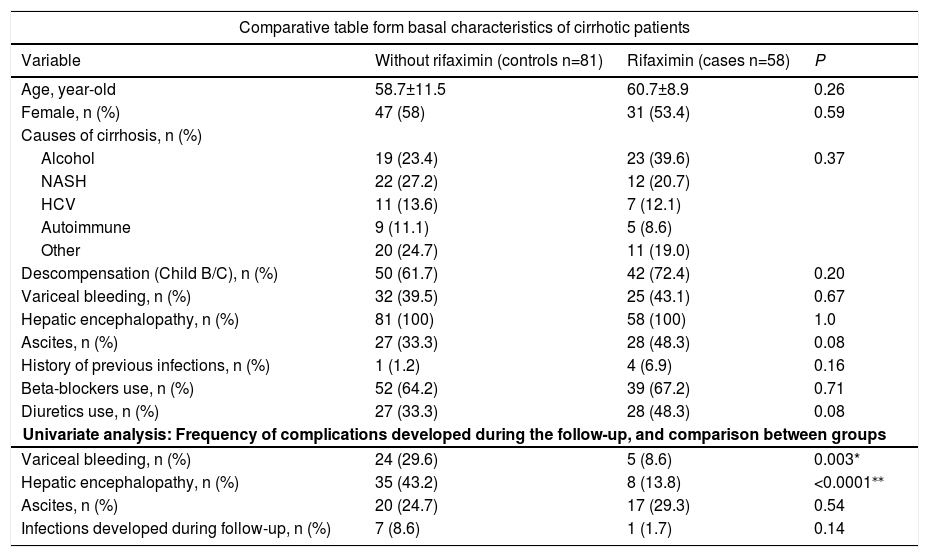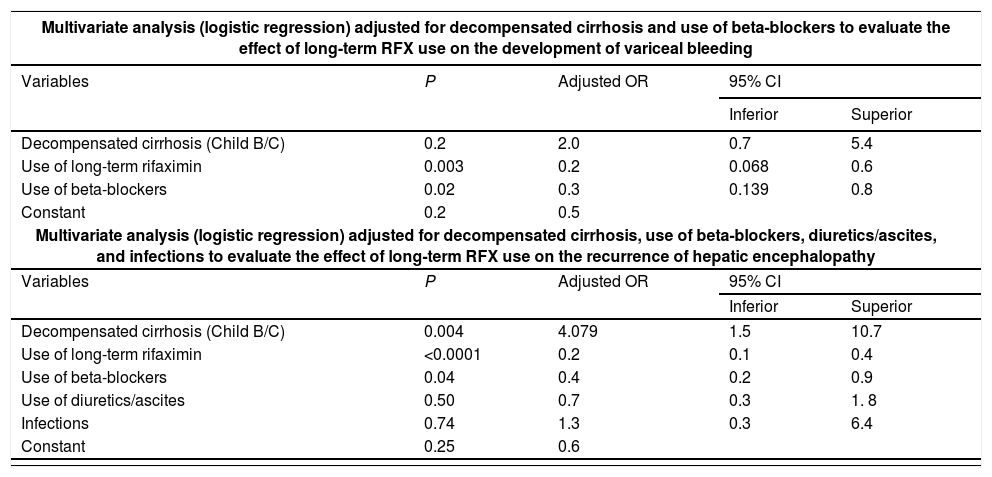
Abstracts of the 2021 Annual meeting of the ALEH (Asociación Latinoamericana para el Estudio del Hígado)
Más datosIs well established that rifaximin (RFX) is effective as secondary prophylaxis in patients with a previous episode of hepatic encephalopathy (EH); but recently, some studies have found that RFX is related to a lower frequency of other complications.
AimTo evaluate the clinical effect of long-term prescription of RFX (more than 6 months) in cirrhotic patients, and also the possible adverse effects.
MethodsA case-control study nested in a cohort which included cirrhotic patients taking secondary prophylaxis with RFX because of history of a previous EH episode. From this cohort we abstracted two different groups, cases were those who continue taking RFX for more than 6 months, controls were those who suspended RFX before the first three months because of medical indication or by their own decision and therefore they did not continue the medication for long-term. The two groups were match by age, gender, decompensation of cirrhosis (Child-Pugh B/C), history in the last year of at least an episode of variceal bleeding (VB), infections, EH, ascites, also was considered the previous use of beta-blockers and diuretics in patients with ascites. Adherence to therapy was mandatory, it was evaluated through the simplified medication adherence questionnaire (SMAQ) in all patients.
Statistical analysisCategorical variables were compared with X2 or Fisher´s exact test, odds ratios and 95% confidence intervals were also calculated. Quantitative variables were compared with Student´s t test. A p<0.05 value was considered significant. Considering the difference in incidence regarding the development of complications between the groups, we also calculate the number needed to treat (NNT) to prevent one event.
ResultsA total of 139 cirrhotic patients who met the selection criteria were identified, of them, 58 were identified as cases taking long-term RFX (41.7%), and were matched with 81 controls without RFX (58.3%). The median time taking RFX was 8.5 months (range= 6-18). The mean dose identified in the medical prescriptions was 400 mg twice or thrice in day. Basal characteristics were similar in both groups (see Table). Patients taking long-term RFX had significant lower frequency of recurrence of EH (adjusted OR=0.2, 95%CI 0.1-0.4; p=0.003; NNT=3.4); and also regard the development of VB (adjusted OR=0.2, 95%CI= 0.068-0.6; p<0.0001; NNT= 4.8); despite no statistical difference, also there was a tendency to a less frequency of severe bacterial infections: RFX 1.7% vs. without RFX 8.6% (NNT= 14.5). There were no adverse effects related to the RFX prescription, neither multidrug resistant bacterial infections were documented.
ConclusionsLong-term use of RFX (more than 6 months) was associated with significant less development of VB, less recurrence of EH, and there was a tendency to a less frequency of severe bacterial infections. Mechanisms that could explain our findings are the modulation of intestinal microbiota, reduction of bacterial translocation, reduction of the inflammatory process and secondary regulation of the portal pressure, all of them possible mediated primarily or secondarily by RFX action.











